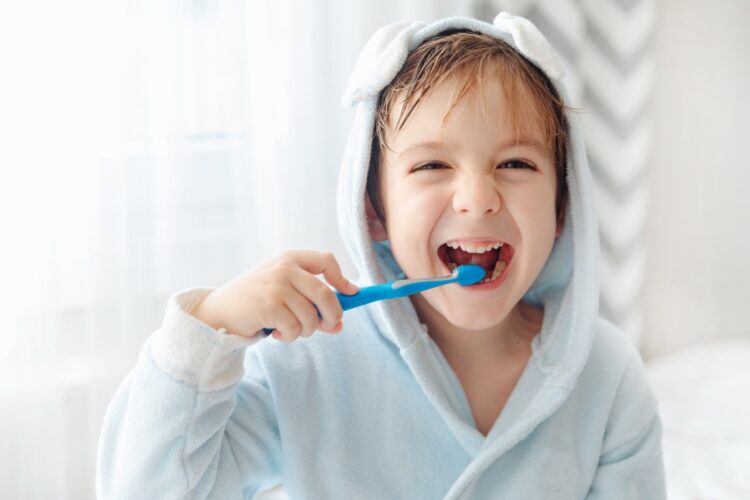As pediatric dentists in Utah, we see some common oral health problems time and again. Some are easier to prevent than others.
Number One Dental Problem in Kids
Without question, the number one dental problem in kids is tooth decay. Also referred to as cavities, tooth decay is caused by a buildup of plaque on tooth enamel. Plaque is acidic, so over time it breaks down the enamel and makes the tooth susceptible to decay.
Preventing Cavities
It probably comes as no surprise that kids aren’t great at brushing and flossing their teeth. This can lead to tooth decay as plaque and food particles work together to erode teeth. Even if a child does manage to get their brush around all their teeth with some toothpaste, they probably aren’t doing it for a long enough time.
Pediatric dentists recommend brushing for about two minutes total. If your independent toddler insists on brushing by themselves, at least stand with them in the bathroom and brush your teeth together. This can encourage them to brush for long enough and to mimic how you move your brush over all sections of your mouth.
Timed, electric toothbrushes can also make brushing more effective in young kids. Be sure to schedule regular pediatric dental cleanings (every six months) to help prevent cavities, and to catch any problems before they get bigger.
Other Common Pediatric Dental Concerns
Besides cavities, other common pediatric dental concerns include the following.
Tooth and Gum Sensitivity
Some kids have teeth that are very sensitive to temperature. It makes eating and drinking unpleasant, and can lead to other health concerns if not addressed. Tooth or gum sensitivity can be caused by:
- Bruxism (chronic teeth grinding)
- Cavities
- Cracked or missing fillings
- Improper flossing (or lack thereof)
- New permanent teeth
- Previous dental work or orthodontia
Preventing Tooth and Gum Sensitivity
Proper oral care can prevent your child from experiencing tooth sensitivity, so be sure they’re brushing and flossing regularly. Children can also use mouthguards at night if a dental checkup shows evidence they’re grinding their teeth.
Pediatric dentists recommend soft-bristled brushes and fluoride-based toothpaste to help prevent sensitivity. Reducing the consumption of acidic food and drink can also protect teeth from sensitivity.
Treatment for tooth and gum sensitivity can range from changing toothpaste to carrying out dental procedures such as fillings, root canals, or bonding.
Dental Emergencies
Unfortunately, it’s common for kids to have dental emergencies of various severities. Whether it’s a chipped tooth or knocking out a tooth entirely, it happens.
Preventing Chipped Teeth
The food your child eats can make them more prone to chipping their teeth. To keep teeth strong, reduce your child’s sugar intake in the form of both food and drink. Try to avoid excessive consumption of acidic foods, such as citrus and soda. You may want to supplement your child’s diet with vitamins that contain the following:
- Calcium
- Magnesium
- Vitamin D
- Vitamin K
Only give children hard candy when they’re old enough to responsibly suck on the treat, and teach them from a young age that teeth aren’t tools and shouldn’t be used as such.
Preventing a Knocked-Out Tooth
You can’t wrap your kids in bubble wrap to prevent them from knocking out a tooth, but you can have them wear a sports mouthguard when they’re engaged in physical activity. You can also try your best to baby-proof your home so your child is less likely to knock out a tooth on sharp edges, but toddler tumbles are inevitable.
So, what should you do if your child does lose a baby or permanent tooth?
BABY TOOTH
You don’t have to try reinserting or preserving a baby tooth that gets knocked out before its time. You should visit your pediatric dentist, though, to have the mouth inspected for any other trauma. A spacer may be required to keep the remaining teeth from crowding the open area.
ADULT TOOTH
Locate the adult tooth and keep it clean. If your child is calm, try to reinsert the adult tooth into the gums and have your child bite down on a clean, moist cloth to hold it in place. You’ll want to get to the dentist as quickly as you can to see if the permanent tooth can be reattached. If not, there are other options available for filling in the gap and giving your child their smile back.
Whatever the dental problem, know that many are common and hard to avoid. The best you can do is teach your children about oral hygiene from a young age, and bring them in for regular dental exams each year.





